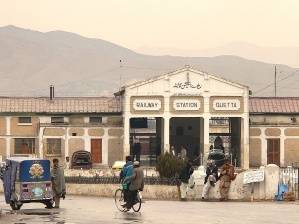
Church leaders and rights activists in Pakistan condemned the killing on Thursday (Sept. 12) of a Muslim in custody on charges of blasphemy.
The alleged assassination of Abdul Ali by a constable identified in news reports as Saad (or Syed) Khan Sarhadi at the Cantonment police station in Quetta, capital of Balochistan Province, shocked citizens across the country, including Christians still reeling from the May 25 lynching of 75-year-old Nazeer Masih Gill on a false blasphemy accusation.
Ali was arrested on Wednesday (Sept. 11) after he allegedly posted a video on social media deemed disrespectful to Islam’s prophet, Muhammad. A raging mob led by members of Muslim extremist religio-political parties Tehreek-e-Labbaik Pakistan (TLP) and Jamiat Ulema-e-Islam-Fazl (JUI-F) stormed the Kharotabad police station shortly after the case was filed under Section 295-C of the blasphemy law, demanding that police hand him over.
The protesters also lobbed a grenade into the police station, but no one was injured, according to media reports.
Sensing Ali’s life was in danger, police had reportedly moved him to the heavily fortified Cantonment police station, where Sarhadi allegedly shot and killed him with his personal pistol, according to news reports. Police reportedly said they had arrested a policeman and charged him with murder but did not name him.
Sarhadi was reportedly arrested on the spot, but TLP and JUI-F activists exalted the crime, calling him a “Ghazi” (victorious warrior). Media reports indicated local residents began visiting Sarhadi’s home, offering their support and presenting flowers to his parents.
The alleged murder was reminiscent of the Jan. 4, 2011 assassination of former Punjab Province Gov. Salmaan Taseer by his police bodyguard Mumtaz Qadri, who opposed his criticism of blasphemy laws. Qadri was later convicted and executed.
The TLP has made headlines for controversial and radical statements and for blasphemy-related violence in recent years, including attacks on multiple churches and homes of Christians in Jaranwala on Aug. 16, 2023 and the lynching of Masih Gill in Sialkot in May.
Church of Pakistan President Bishop Azad Marshall said the manner in which Islamist groups and the general public supported the alleged assassination showed how deeply extremism has become rooted in Pakistani society.
“The societal approval of extrajudicial actions not only undermines the judicial process but also fuels a cycle of violence where accusations of blasphemy can lead to immediate and deadly consequences, bypassing due process,” Marshall told Christian Daily International-Morning Star News.
Such incidents have become routine, but despite repeated appeals for action, the government has done nothing to stop such senseless violence, he said.
Marshall said glorification of murderers would encourage more abuse of the blasphemy laws.
“This is very dangerous situation for all Pakistanis, especially Christians, as we are already a very vulnerable community,” he said.
U.K.-based Christian Solidarity Worldwide (CSW) condemned the killing and urged the Pakistani government to take strict measures against all those responsible for such acts and to curb the misuse of the blasphemy laws.
“Regardless of the accusations against him [Ali], it was the duty of the police to protect him, and thus it is extremely worrying that he was shot and killed while in custody,” CSW President Mervyn Thomas said in a Sept. 12 statement. “Who will ensure the safety of such victims when the police itself is involved in such acts of violence? The continued criminalization of blasphemy is wholly incompatible with Pakistan’s national and international commitments to freedom of religion or belief, and a dangerous driver of religious extremism in the country.”
Samson Salamat, chairman of the Rwadari Tehreek (Movement for Equality), called for enacting and enforcing comprehensive laws that address all aspects of violent extremism.
“However, it should be ensured that the legislation upholds human rights and civil liberties to avoid alienating communities,” he told Christian Daily International-Morning Star News.
Salamat said that an affiliate of the Rwadari Tehreek, the Center for Human Rights Education, has prepared a policy paper that contained recommendations and strategies to counter religiously-motivated violence.
“Turning violent trends into nonviolence requires a concerted effort across multiple sectors, including education, community engagement, legal reforms, media, and governance,” he said.
By implementing recommendations in the policy paper, Pakistan can gradually transition towards a more peaceful and inclusive society where conflicts are resolved through dialogue and cooperation rather than violence and coercion, he added.
In Muslim-majority Pakistan, mere accusations of blasphemy, which is punishable by death in the country, have led to street lynchings. Human rights groups say Pakistan’s harsh blasphemy laws are often misused to settle personal scores.
At least seven persons accused of blasphemy have been killed by individuals or mobs over blasphemy allegations across Pakistan since January, according to the Lahore-based Center for Social Justice (CSJ). A total of 94 people accused of blasphemy were killed in mob attacks between 1994 and 2023.
Pakistan ranked seventh on Open Doors' 2024 World Watch List of the most difficult places to be a Christian, as it was the previous year.





